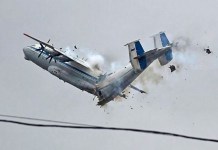OP-ED by Rebecca Cantor
Over the past few months, Iran has steadily increased its presence in the Arabian Gulf with recent attacks signaling a building pressure in the area.
The Arabian Gulf nests within the coasts of Iran, Iraq, Kuwait, Saudi Arabia, Qatar, the United Arab Emirates (UAE), and Oman, funneling into the Strait of Hormuz, acting as an important trade passage through which a fifth of the world’s oil passes.
Many of these attacks have targeted Israeli-owned or affiliated vessels, such as the Mercer Street tanker that was attacked on July 29 off the coast of Oman with a kamikaze drone, killing two crew members, one British and one Romanian.
The attack led to an outcry of the G7 leaders who were united in their blame of Iran, condemning the attack as “a clear violation of international law,” despite the Iranian Foreign Ministry spokesman Saeed Khatibzadeh claiming the allegations against Iran were “baseless.” After an investigation, conducted by the Pentagon, a team of experts determined the deadly drone to be Iranian-produced.
Less than a week later on August 3, the Panama-flagged Asphalt Princess was hijacked on its route to the Strait of Hormuz and was rerouted toward Iranian waters. The US, the UK, and Israel have blamed Iran for the attack, yet, unsurprisingly, Iran’s Revolutionary Guards dismissed the attribution of Iranian involvement as a “hostile action” against Tehran.

Back in April, another Israeli-owned vessel, the Hyperion Ray, associated with the Israeli Ray Shipping company, was attacked near the shores of the UAE. The incident occurred the day after Iran vowed to avenge its nuclear facility explosion, which Iran claimed was an Israeli sabotage plot.
In February, the Israeli-owned MV Helios Ray was struck by an explosion in the Gulf of Oman. Though the crew was unharmed, the vessel sustained four holes from the blast and was forced to dock in Dubai. Iranian leaders did not respond to the incident, but then-Prime Minister Benjamin Netanyahu of Israel, as well as other Israeli officials, publicly blamed Iran for the explosion.
Implications For Saudi Arabia, UAE
The dangerous presence of Iran within the Arabian Gulf is set to have worrisome implications, not just for Israeli vessels but for the surrounding nations, particularly Saudi Arabia and the UAE. Indeed, Iran cannot afford an all-out war with the nations, so it has resorted to guerilla-style sea warfare, sabotaging incoming vessels which pass Iranian shores along their trade routes.
While the Iranian attacks in the Arabian Gulf will certainly add to the ever-present tension in the Middle East, the effects do not stop there. The Strait of Hormuz, the narrow passage that connects the two Gulfs, is geopolitically crucial for oil exports, as a fifth of the world’s oil passes through the strait. This port is crucial to the economies of Saudi Arabia and the UAE, as well as the importing nations, such as China and Russia.

Iran, however, no longer has use for the Strait of Hormuz, as it recently opened its own oil export terminal in Bandar-e-Jask. This port rests south of the Strait on Iran’s Gulf of Oman coast, meaning its exports no longer have to travel down through the Strait of Hormuz.
Francois Tessier, Senior Advisor for Gulf Policy Research Group, stated “the rising tensions, instigated by Iran, has placed international shipping and trade in a vulnerable position. Indeed, such hostilities in the Strait of Hormuz could severely impact retailers and other trade routes, leading to a serious backlog and closure of the port.
Similar to the closure of Yantian, the world’s third busiest port based in China, a shut down in the Gulf could have serious ramifications on the global economy”.

Iran has previously threatened to block the Strait if its oil exports were threatened by US sanctions, and its desire to curb exports to and from Saudi Arabia and the UAE is clear.
Coupled with a new trade route of its own, Iran only has more incentive to both block the Strait and sabotage incoming vessels. Because Iran’s coast stretches across the entirety of the Arabian Gulf, the Strait of Hormuz, and the Gulf of Oman, passing vessels headed to competitor nations are strategically vulnerable to an Iranian attack.
Western Nations’ Response
So far, the US Navy presence, as well as the UK’s Royal Navy, has monitored and protected global trade to and from the area. However, former President Trump expressed a desire to stop funding US military intervention in the Strait, citing that oil exports traveling through the Gulf go East, primarily supporting China, not the US Indeed, Trump was right—only 16% of the American energy supply travels through the Strait.
America has no real incentive to protect the Hormuz flashpoint, as much of the trade directly benefits China and non-democratic Middle East interests. But other nations have their own incentives.
As of August 23, Moscow’s ambassador to Tehran has said that Iran, China, and Russia will begin working together in the Arabian Gulf as early as this year or early 2022, holding joint maritime drills as a result of the United Nations lifting its arms embargo against Iran.
This means that Iran, with the help of Russia and China, will likely see an influx of arms and an influx of oil exports through its new seaport, now emboldened to continue attacking enemy vessels through the geopolitically significant Hormuz.
Delighted to welcome 2020 with our Chinese friends in Beijing.
Potentials of 25-year bilateral roadmap to further solidify Iran-China comprehensive strategic partnership are immense.
We intend to realize them, while also pursuing closer regional and global cooperation. pic.twitter.com/EhPAEZnyCl
— Javad Zarif (@JZarif) December 31, 2019
Iran is knowingly committing what is seen as energy terrorism by sabotaging the Strait of Hormuz. China will play along and incentivize Iran’s actions through weapons, all while growing its sphere of influence in the Middle East.
In the meantime, the Biden administration is cutting American self-reliance on energy, which will undoubtedly ramp up reliance on Chinese-provided energy, such as battery and solar power, the resources for which China owns a monopoly.
The US is now seeing a return to crude oil and petroleum importation, signaling an end to Washington’s energy independence. Indeed, the US is set to import more petroleum goods and reduce exports.
This would require Washington to ensure safety and security in the Arabian Gulf so as to maintain smooth passage of oil tankers. So, does that mean whether the US will rethink its military strategy to counter threats by Iran and possibly China and Russia at a later stage?
There is no easy answer to that and only time will tell if Washington would stand by its ally Israel or for that matter, friendly nations like the UAE and Saudi Arabia, which face greater dangers because of purported Iranian covert operations in the Gulf.
(Rebecca Cantor is a London-based business consultant and analyst, and a contributor to New Europe. Views expressed are her own.)




